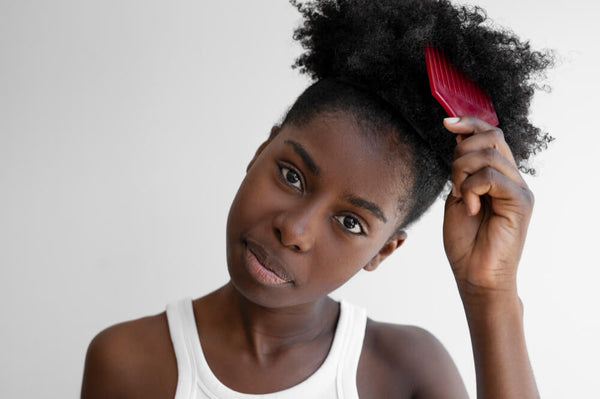I want you to think about the last time you sat in a hair specialist's office. That moment when they looked at your thinning edges or widening part and suggested something generic like "use less heat" or "try this shampoo." You probably left feeling dismissed, maybe even a little embarrassed, like your hair problems were just cosmetic concerns rather than real medical issues.
Here's what I want you to know: that sinking feeling you get when another professional doesn't understand your hair? That's not your fault. Most trichology training programs spend shockingly little time on Black hair and scalp conditions. They might be experts on general hair loss, but when it comes to CCCA, traction alopecia, or properly diagnosing conditions on melanated skin? The knowledge gap is massive.
What Can a Black Hair Trichologist Actually See That Others Miss?
When I examine a Black woman's scalp for the first time, I'm looking for patterns that most trichologists would overlook. The early signs of CCCA that look like "just thinning" to an untrained eye. The specific inflammation patterns from years of protective styling. The subtle texture changes that signal nutrient deficiencies.
A trichologist who specializes in Black hair understands that your curved follicles and delicate hair shafts require completely different treatment approaches. They know that microneedling depths need adjustment for our scalp sensitivity, that certain PRP techniques work better for textured hair, and that products designed for straight hair might actually damage yours.

Why Do Most Hair Treatments Fail Black Women?
I see women every week who've spent thousands on treatments that were never going to work for their specific condition. The problem isn't that the treatments are bad - it's that they weren't designed for our hair's unique needs.
For example, if the hair loss is due to CCCA, it is necessary to carry out an immediate, aggressive treatment with anti-inflammatory agents in order to rescue the hair follicles before they become scarred. And if the loss of hair is due to traction alopecia, it should be given proper treatment with certain rehabilitation strategies that consider the styling practices.
No amount of generic "hair growth" serums can address these issues, which is why so many women feel like they're throwing money away on solutions that were never meant for them.
How Can You Spot a Trichologist Who Actually Understands Black Hair?
Before you book another appointment, look for these signs to know if they are a real expert:
-
During your consultation, they should ask detailed questions about your hair care practices without judgment.
-
They should understand the difference between CCCA and regular thinning.
-
They should have before-and-after photos of clients with hair similar to yours.
-
And they should be able to explain exactly how they'll adjust treatments for your hair texture and scalp needs.
If they push the same oils and products to every client or if they can't show you results on Black hair, that's your sign to keep looking.
What Should Your First Trichology Appointment Actually Accomplish?
Your first visit with the right trichologist should feel completely different from previous hair consultations. We use advanced scalp imaging to show you exactly what's happening beneath the surface - things you can't see with the naked eye. We might recommend specific lab work to check for nutrient deficiencies or hormonal imbalances that could be contributing to your hair loss.
Most importantly, you should leave with a clear understanding of what's actually causing your hair issues and a personalized plan that addresses your specific needs - not generic advice that could apply to anyone.
When Should You Seek Specialized Trichology Care?
If you're noticing any of these signs, it's time to find someone who specializes in Black hair:
-
Your edges are thinning despite being "gentle" with your hair
-
You have scalp tenderness, bumps, or persistent itching
-
Your part is getting wider each month
-
You're seeing more hair in the drain than usual
-
Previous treatments haven't delivered results
The earlier we can intervene with conditions like CCCA, the more hair we can save. Waiting until you have visible bald spots often means we're working to preserve what's left rather than restoring what's been lost.
It’s Time To Get Your Hair Treated Before You Start Losing Them
Stop settling for hair specialists who don't understand your hair. You deserve a trichologist who sees your hair as unique, not difficult. Book your $99 Hair Therapy Evaluation at Nina Ross Hair Therapy and experience the difference that comes with working with Atlanta's leading Black hair specialist.
Let's finally get you the answers - and results - you've been searching for.
Ready to Stop Guessing?
Look, we get it. You've probably already tried things that didn't work. Maybe multiple things. And it's frustrating and expensive and just... exhausting.
At Nina Ross Hair Therapy, we're board-certified, we work with Black hair every single day, and we're not interested in being another failed attempt on your list. We want to be where you finally get real answers.
If you're ready to work with someone who actually understands your hair and has the medical training to back it up, let's start with a hair loss evaluation.















